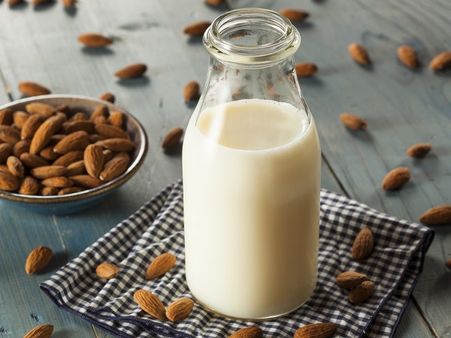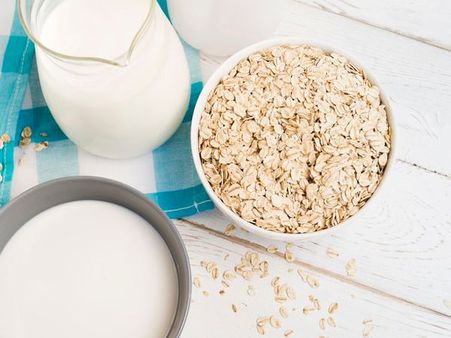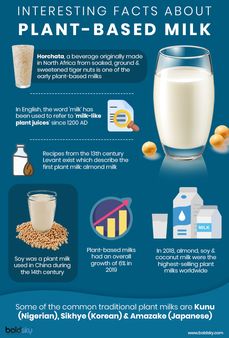Just In
- 21 min ago

- 55 min ago

- 6 hrs ago

- 9 hrs ago

Don't Miss
- Sports
 Who Won Yesterday's IPL Match 33? PBKS vs MI, IPL 2024 on April 17: Mumbai Indians Escape Last-Ditched Fight by Punjab Kings To Win
Who Won Yesterday's IPL Match 33? PBKS vs MI, IPL 2024 on April 17: Mumbai Indians Escape Last-Ditched Fight by Punjab Kings To Win - Movies
 Do Aur Do Pyaar OTT Release Date & Platform: When & Where To Watch Vidya Balan’s Film After Theatrical Run?
Do Aur Do Pyaar OTT Release Date & Platform: When & Where To Watch Vidya Balan’s Film After Theatrical Run? - Finance
 Wipro Q4 Results Preview: Weak Demand Likely To Drag Revenue Sequentially, EBIT Margins Seen Stable
Wipro Q4 Results Preview: Weak Demand Likely To Drag Revenue Sequentially, EBIT Margins Seen Stable - News
 BRS Chief K Chandrasekhar Rao Slams BJP, Says K Kavitha's Arrest Is Vendetta Politics
BRS Chief K Chandrasekhar Rao Slams BJP, Says K Kavitha's Arrest Is Vendetta Politics - Automobiles
 Aprilia RS 457 Accessories: A Detailed Look At The Prices
Aprilia RS 457 Accessories: A Detailed Look At The Prices - Education
 Karnataka SSLC Result 2024 Soon, Know How to Check Through Website, SMS and Digilocker
Karnataka SSLC Result 2024 Soon, Know How to Check Through Website, SMS and Digilocker - Technology
 Nothing Ear, Ear a With ANC, Up to 42.5 Hours of Battery Launched; Check Price and Availability
Nothing Ear, Ear a With ANC, Up to 42.5 Hours of Battery Launched; Check Price and Availability - Travel
Telangana's Waterfall: A Serene Escape Into Nature's Marvels
Amazing Health Benefits Of Vegan Milk (Plant-based Milk)
Plant-based milk or vegan milk is everywhere. From tiny coffee shops to extravagant restaurants, plant-based milk is no longer a gourmet luxury, but a part of one's daily diet. One of the increasing popularity of cruelty-free milk can be attributed to the human population's reduced ability to digest lactose after infancy. Studies have pointed out that about 90 per cent of the adults in the world are mildly lactose intolerant [1] . And the other reason being the advent of Veganism - a way of living which seeks to exclude all forms of exploitation of, and cruelty to, animals for food, clothing or any other purpose.

With the demand for plant-based milk on the rise, let us get to know some of the most common types of vegan milk and the benefit they have on your body.

What Is Plant-based Milk?
A lactose-free substitute to cow milk, plant-based milk or vegan milk is commonly made from almond, cashew, oats, rice or coconut. Also termed as mylk, plant-based milk is not just cruelty-free but also possess various additional benefits. The low amount of fat in these types of mylk, along with the good protein content makes vegan milk a perfect alternative for cow milk or goat milk - basically milk that has lactose in it.
A dairy-free diet helps your body and overall health in various ways such as improving digestion, preventing acne, promoting weight loss, improvement in metabolism and energy levels and does not cause any inflammation that would lead to the growth of unhealthy gut bacteria linked to some chronic diseases or conditions including leaky gut.
In the current article, we will take a look at some of the most common types of plant-based milk and how they help promote a healthy lifestyle.

1. Soy Milk
The most commonly used substitute for cow's milk, studies have asserted that soy milk is the most nutritionally-balanced of the plant-based milk alternatives. The study compared the plant-based milk with that of other similar options and cow's milk as well; soy milk comes closest to cow's milk. Made from the beans of soy, the type of milk is suitable for those who are lactose intolerant.
Benefits
- Rich in protein, soy milk can help promote a balanced diet.
- Dietary sources of oestrogen and progesterone found in soy milk aids in the balance of hormone levels in women during menopause.
- The plant-based milk is also cholesterol-free and packed with essential monounsaturated fats and polyunsaturated fatty acids (the good guys) which helps in lowering cholesterol and promoting cardiovascular health.
- Soy milk has a high-calorie content - which can lead to weight gain.
- As soy is one of the common allergens, drinking soy milk can cause swelling, hives, diarrhoea, bloating, headache and vomiting in some individuals.
- Young children are increasingly prone to soy allergies.
Side effects

2. Almond Milk
The second popular option in vegan milk, almond milk is made by soaking almonds in water and then blending and straining away the solids. Unsweetened almond milk is low in calories and is low in carbohydrates - making it suitable for a low-carb diet. Researchers have suggested that almond milk is an effective alternative for children and adults who suffer from allergies or intolerances to milk. Compared to rice and soy milk, almond milk naturally has the most vitamins and minerals including copper, zinc, iron, magnesium, calcium, potassium etc.
Benefits
- It has a high content of monounsaturated fatty acids (MUFA) that can aid in weight loss and weight management.
- This vegan milk is a naturally good source of the antioxidant vitamin E.
- Unsweetened almond milk does not raise blood sugar levels, therefore, making it beneficial for individuals with diabetes.
- Some brands of almond milk contain added sugar, which is not a healthy addition.
- Many brands contain additives like carrageenan to thicken and prevent separation, which can cause intestinal inflammation and damage.
- Individuals with tree nut allergies should avoid almond milk.
- It is not preferable for children as it is low in protein and calories.
Side effects

3. Oat Milk
Naturally sweet from the oats, oat milk is nutritious and contains soluble fibre. Enriched with vitamins and calcium, the milk has a low saturated fat content. The soluble fibre in it gives the milk a creamy texture and in comparison to other types of plant-based milk, oat milk has the highest amount of calories and carbohydrates. Always opt for gluten-free oat milk.
Benefits
- It is beneficial for people with gluten intolerance or celiac disease.
- Oat milk is high in beta-glucans (a soluble fibre) which help lower blood cholesterol.
- Often fortified with calcium and vitamin D, this vegan milk boosts bone health.
- The soluble fibre in oat milk helps slow digestion and keeps you feeling full for longer.
- It also helps stabilize your blood sugar levels.
- Avoid sweetened or flavoured oat milk as they are high in sugar.
- Oat milk with added sugar can impact digestive health and could alter the gut microbiome.
Side effects

4. Hemp Milk
Made from ground, soaked hemp seeds, hemp milk do not contain the psychoactive component of the Cannabis sativa plant. High in protein and omega-3 and omega-6 unsaturated fats, hemp milk is naturally carbohydrate-free. However, some brands have added sugar which is composed of brown rice syrup, evaporated cane juice, or cane sugar.
Benefits
- Studies indicate that unflavoured hemp milk can help lower a person's overall cholesterol.
- As it is rich in an omega-3 fatty acid called alpha-linolenic acid (ALA), hemp milk may help reduce the risk of heart disease and inflammation.
- The presence of omega-6 and omega-3 fatty acids can help promote skin health.

5. Coconut Milk
This type of milk is made from the white flesh of a coconut. Coconut milk has a pleasant flavour and has less protein than almond milk. In comparison to other plant-based milk types, coconut milk contains small amounts of beneficial medium-chain triglycerides that are beneficial for one's overall health.
Benefits
- The triglycerides fats in coconut milk help improve one's energy levels.
- It may help improve one's immune system.
- The medium-chain triglycerides (MCTs) may help improve an individual's heart health by promoting the HDL (good) cholesterol levels and reducing the levels of harmful low-density lipoproteins (bad cholesterol) that are associated with cardiovascular diseases.
- It is rich in saturated fat which can cause a rise in your LDL (bad) cholesterol and increase the risk for heart disease and stroke.
- Consuming too much of the milk can result in weight gain.
- Coconut milk also contains fermentable carbohydrates which can cause digestive issues, such as diarrhoea or constipation, in people with irritable bowel syndrome.
- Individuals with tree nut allergies can consume coconut milk, however certain proteins in it can cause allergic reactions such as abdominal pain, nausea, vomiting, diarrhoea and itching or irritation of the mouth, throat, eyes, or skin.
Side effects

6. Rice Milk
Made by combining partially milled rice and water, rice milk has a sweet flavour and comes in a variety of flavours. As it comes from a grain, rice milk has a high carbohydrate content. Rice milk is the most hypoallergenic compared to other options and has the highest amount of manganese and selenium compared to the other milk substitutes.
Benefits
- The presence of antioxidants in the milk help prevent the onset of infections and boost your immune system.
- Rice milk has very low-fat content, making it suitable for a weight-loss diet.
- It is beneficial for individuals suffering from cholesterol.
- A good source of B vitamins, rice milk can help improve one's metabolism, circulation and nerve function.
- It is proven to promote cardiovascular health.
- It is high in carbohydrates, so it's the least desirable choice for people with diabetes.
- Uncontrolled consumption of rice milk can cause health risks for infants and children due to inorganic arsenic levels.
Side effects
Some of the other common types of plant-based milk are flaxseed milk which is one of the best plant sources of omega-3 fatty acids, cashew milk which is a good alternative for those watching calories and carbohydrates, and peanut milk which is a great source of omega-6 fatty acids.

On A Final Note…
Although dairy milk has its benefits, various studies and reports have pointed out that plant-based milk is increasingly beneficial for an adult's health. In comparison, vegan milk is lower in sugar and calories, does not trigger the release of ICF-1 hormones (linked with cancer cell growth and acne) and are easy to digest.
However, some of the cons of these plant-based milk are that they are low in protein, calcium, and certain vitamins and minerals, thereby requiring one to look for substitutes. All in all, plant-based beverages are not an exact substitute for cow's milk but are cruelty-free and a tad bit healthier. For an adult, plant-based milk is the best option.
- [1] Oak, S. J., & Jha, R. (2019). The effects of probiotics in lactose intolerance: a systematic review. Critical reviews in food science and nutrition, 59(11), 1675-1683.
-
 recipesWorld Milk Day Special: How To Prepare Oatmeal With Almond Milk For A Healthy Breakfast
recipesWorld Milk Day Special: How To Prepare Oatmeal With Almond Milk For A Healthy Breakfast -
 nutritionAlmond Milk: Health Benefits, Uses And How To Make
nutritionAlmond Milk: Health Benefits, Uses And How To Make -
 nutrition10 Vegetarian Foods Rich In Vitamin B12
nutrition10 Vegetarian Foods Rich In Vitamin B12 -
 wellnessTop 6 Health Benefits If You Drink Almond Milk With Honey
wellnessTop 6 Health Benefits If You Drink Almond Milk With Honey -
 hair careBenefits Of Almond Milk For Your Hair
hair careBenefits Of Almond Milk For Your Hair -
 nutritionOat Milk: Nutrition, Health Benefits And How To Make
nutritionOat Milk: Nutrition, Health Benefits And How To Make -
 nutritionNational Milk Day 2020: 10 Health Benefits Of Homemade Oat Milk
nutritionNational Milk Day 2020: 10 Health Benefits Of Homemade Oat Milk


 Click it and Unblock the Notifications
Click it and Unblock the Notifications



